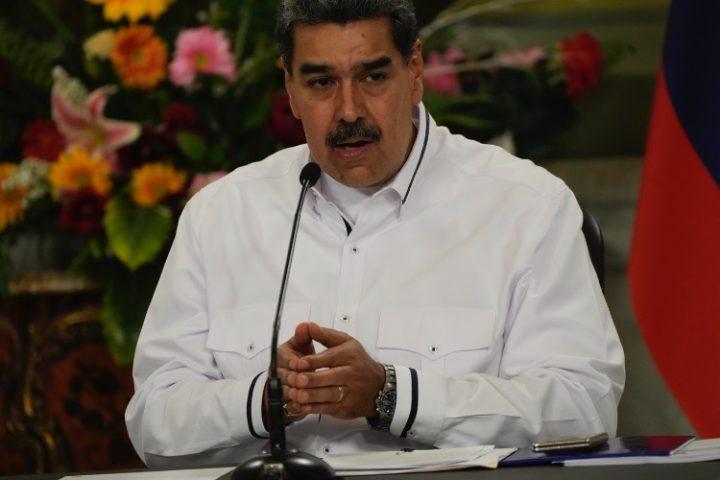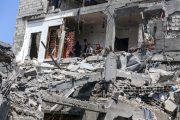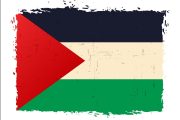
Recently, analysts have noted how leftist Latin American governments on friendly terms with the Tehran regime have given Iran and its proxies such as Hezbollah a huge opportunity to be involved in organized crime and participate in more direct state-to-state interactions.
“There’s always been a certain level of, not only networks, but also influence by both Hezbollah and behind Hezbollah, Iran, in the region,” observed Evan Ellis, a former U.S. State Department official and research professor of Latin American studies at the U.S. Army War College Strategic Studies Institute.
“That increased with respect to the state-to-state Iranian engagement largely through populist actors in the mid-2000s, with a new crop of leftist populist leaders: Hugo Chavez in Venezuela, Evo Morales in Bolivia, and certainly Rafael Correa in Ecuador, among others.”
This political movement toward the left in Latin America includes the recent reported entry of Iran and terrorist agents into the region via Venezuela in 2022. During that incident, the United States requested for a plane to be grounded and seized in Argentina. It was discovered that the state-owned aircraft harbored five Iranian nationals, whom Paraguayan officials and others maintained were connected to the Quds Force, which the United States has classified as a terrorist organization. Argentina rebuffed claims that crew members were associated with Quds.
The seizure in 2022 went hand-in-hand with the political ascendency of many of populist actors in various South American countries. “Essentially, you’re taking Quds Forces operatives and Hezbollah-affiliated personnel around the region,” Ellis said.
Following the October 7 attacks by terrorist group Hamas on Israel, the United States and Israel are justifiably worried that Hezbollah, Iran’s oldest proxy, could launch a second front in the Israel-Hamas conflict. Recently, Hezbollah proclaimed that it views itself as part of the ongoing Israel-Hamas conflict, threatening to intervene once Israel’s ground forces enter Gaza. However, given Iran and Hezbollah’s rise in Latin America, one must not exclude the possibility of terrorist attacks beyond the Middle East.
After all, Hezbollah has for years steadily constructed a global web of networks embroiled in illicit financial activities and has backed terrorist plots around the world, regularly attacking Western and Israeli targets.
Moreover, many Latin American regimes do not regard Hezbollah as a terrorist organization. Only Argentina, Colombia, Guatemala, Honduras, and Paraguay deem Hezbollah a terror threat. In light of this, local authorities’ abilities to prosecute or track Hezbollah and its local operatives are limited.
Besides, regimes such as the one under Venezuela’s Nicolás Maduro have openly voiced support for Hezbollah. At the moment, the Maduro regime has effectively emerged as Iran’s operating base in Latin America, with the Maduro government overlooking Iran-linked drug-trafficking operations in communities in Colombia and Panama.
Furthermore, the tri-border area of Paraguay, Argentina, and Brazil has been a longstanding money-laundering environment for Hezbollah, supplying funding for the terror group’s Middle East activities. All three countries have large populations of Lebanese origin.
The tri-border region’s hub is Ciudad del Este, Paraguay, a thriving hive of traders and traffickers hawking merchandise from around the world, including pirated DVDs and guns. A free-trade zone, this area has a reputation for being a center of sketchy transactions and crime.
In 2014, Brazilian newspaper O Globo reported that Lebanese traffickers linked to Hezbollah had helped one of Brazil’s biggest drug gangs, the PCC, purchase arms and sell stolen explosives, quoting leaked federal police documents.
Additionally, pro-Palestinian radical activism has resonated deeply with Latin American radical leftists, with Hezbollah and Iranian fronts enjoying access to local political leaders and obtaining a cover for their activities.
Major state actors have enabled transnational terrorist activities by offering criminals wanted by Interpol transportation on state-run airlines, along with real passports with aliases.
“The speed and ease with which Hezbollah operatives are able to secure false documentation in Latin America should not come as a surprise,” stated Matthew Levitt in a 2013 House Homeland Security hearing. At the time, Levitt served as the counterterrorism and intelligence director at the Washington Institute for Near East Policy.
“According to Israeli intelligence, the use of such passports by Hezbollah operatives is widespread, and the documents are used by the organization’s activists in their travels all over the world.”
The recent escalation of Israel-Hamas tensions have further elucidated Iran’s connections to Latin America. On November 8, two alleged Hezbollah operatives were arrested in Brazil for plotting attacks in the country. Also, warnings of a terror threat to the United States have increased, especially given the dismal security situation at the porous southern border.
To make matters more complicated, Chile and Colombia, both with newly-elected leftist administrations, recalled their ambassadors from Israel on October 31, slamming Israel’s offensive against the Hamas terrorists.
On the same day, Bolivia, which had signed an agreement with Iran in July to boost “defense and security cooperation,” cut diplomatic ties with Tel Aviv. In July, Iran’s Defense Minister declared that Latin American nations had a “special place in Iran’s strategic outlook,” and that more countries in the region could model Iran’s cooperation with Bolivia.
Carlos Berzaín, Bolivia’s former minister of defense and now head of the Interamerican Institute for Democracy, asserted that every Latin American country being governed under “21st century socialism” has been “publicly converted into an enemy of the United States — adopting the rhetoric Cuba has had for almost 65 years — with very grave political and security consequences.”
Venezuela’s socialist dictatorship typically uses the term “21st century socialism” to portray its ruling ideology.
Berzaín said that Bolivia was a case study of how socialists (in late 2020) took over after a brief period with the opposition in power.
“Today, Bolivia, as a dictatorship, is dependent upon the leadership of Cuba’s dictatorship, and its foreign policy shows it,” he told the Epoch Times.
“It is at the service of other dictatorial regimes like Iran, Russia, and China with which there is no traditional or legitimate interest in the type of relations they maintain. Those are founded on corruption … on Bolivia’s condition as a narco-state, and on favoring crimes such as terrorism with an ‘anti-imperialist’ rhetoric.”
Leading Iran analyst Emanuele Ottolenghi, a senior fellow at the U.S.-based Foundation for the Defense of Democracy, reinforced the reality that terrorist networks have since expanded their tentacles.
“In Brazil, the sympathetic government of Luis Ignacio Lula da Silva has allowed Hezbollah and Iranian fronts to quietly expand with little risk of scrutiny from authorities,” Ottolenghi penned in an article on October 28.
“In Chile, with a strong and radicalized Palestinian diaspora, Iranian agents and Hezbollah networks have infiltrated government, media, and academia, in addition to running illicit financial networks.”
“For decades, Hezbollah has patiently built a global web of networks, engaged in illicit financial activities, and supported terrorist plots,” Ottolenghi wrote.



